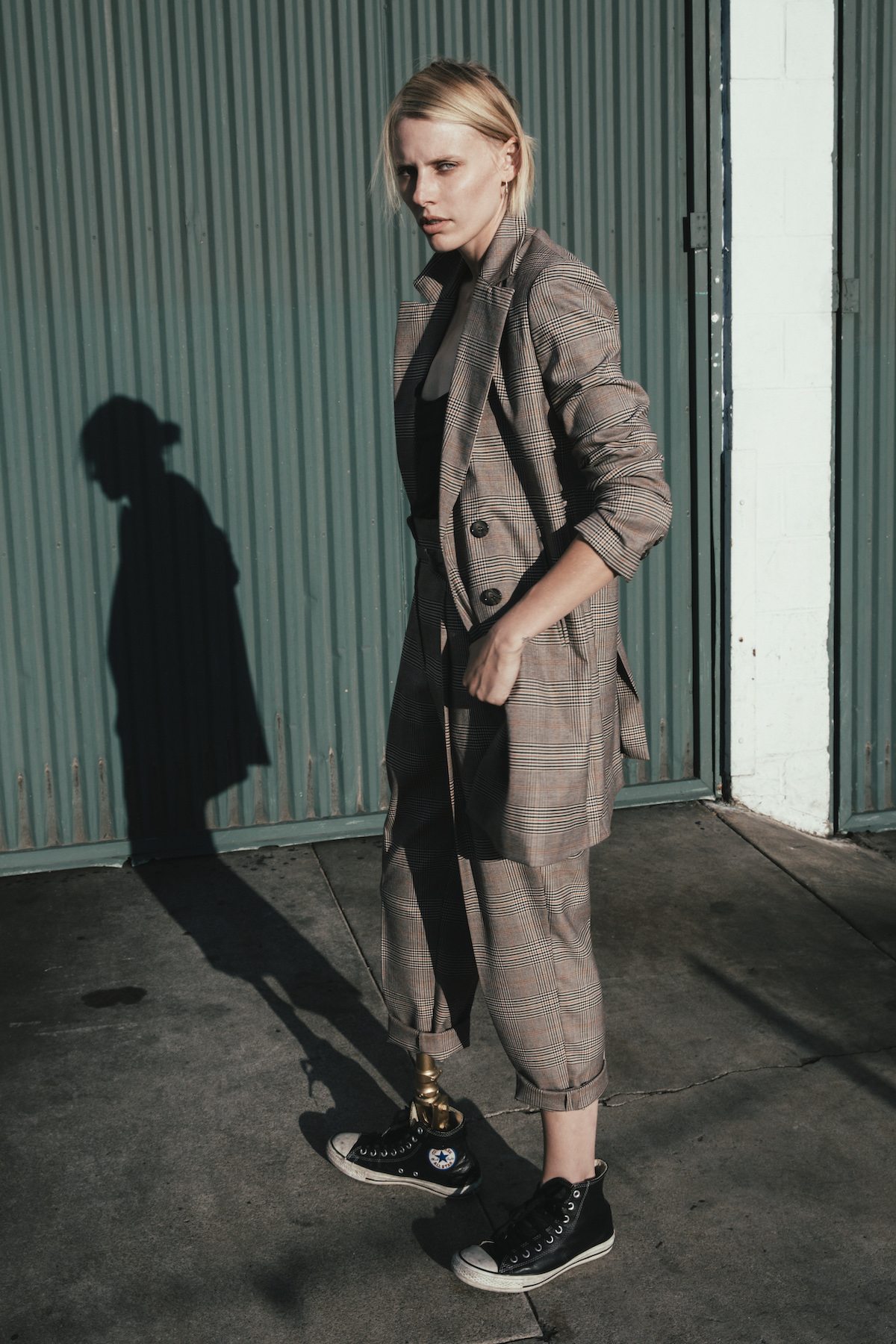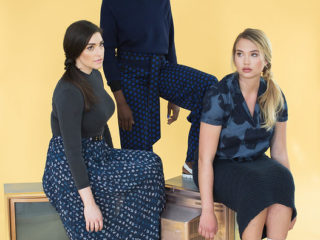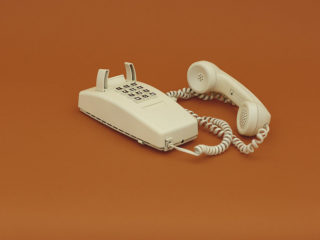Editor’s Note: This interview contains some graphic medical details.
“There’s no reason that, medically, I should be alive. My stack of papers is like, ‘This girl should be dead.'”
Lauren Wasser felt off. She was also on her period, something that most women can relate to as causing that general sense of being in the wrong body — the monthly mind game of: Did I just gain weight overnight? Is my heart fluttering abnormally fast? Do I need to switch face washes… again?
In other words, Lauren didn’t think twice about her flu-like symptoms and the need to change her tampon; surely, the two were unrelated. It would only be a matter of time, however, before she would end up in a medically-induced coma, being pumped with 80 lbs of fluid and given a 1% chance of survival. Diagnosis? Toxic Shock Syndrome (TSS).
Caused by an overgrowth of Staphylococcus aureus, the normally harmless bacteria ever present in the vagina, TSS occurs when Staph finds a favorable condition in which to overpopulate, thereby releasing toxins into the bloodstream through microscopic vaginal tears.
Saturated, polyester-based tampons are one such favorable environment, and it’s thought that the sliding and/or removing of a tampon can create these tears after drying out vaginal lining. Once toxins are in the bloodstream, it’s a rapid, downward progression as the body tries to fight off infection. If not caught early, TSS can be fatal due to hypotensive shock and resulting systemic organ failure.

Thankfully, Lauren is counted as one of the lucky ones — even though she lost her right leg in the process and, as of next month, will need to undergo a second amputation of her left leg as well. Going from healthy, active young woman with a thriving modeling career to sudden amputee (as a result of normal tampon use) was understandably difficult. But as you’ll read below, Lauren’s refused to let her experience have the final say over her spirit.
In her own words, here’s more of her story:
Nicole Ziza Bauer: Let’s begin with a little background. What was life like prior to TSS?
Lauren Wasser: I’ve modeled since I was four months old, appearing in Italian Vogue with my mom. My parents were both models and I kind of grew up in the world of perfection. My mom was one of the supermodels in the early 90s when it was really the dope time to be an “It Girl,” so I was around Stephanie Seymour and Cindy Crawford and my mom was a VS girl. I grew up really knowing only one side of beauty.
I’ve always been an athlete as well; I’ve always been a tomboy. So anytime I can get away from wearing heels and put on some Jordans or sandals, that’s pretty much always been me.
NZB: Since most women very rarely experience TSS, can you explain the moment when you felt something was wrong or off?
LW: It’s actually not rare, it happens more often than you think. It’s a lot of times misdiagnosed or, unfortunately, just too late.
For me, I’d been using the same product for 11 years. My period is very heavy and, like I said earlier, I’m an athlete. So I’d be constantly working out, riding my bike thirty miles and changing my tampon more frequently than usual. That morning I’d ran out of my go-to box of tampons so I went to a local store, got a new box and changed it as normal. The flu had been going around, so once I felt a little weird I just assumed I was coming down with it because I had flu-like symptoms. I’m [also] just that type where, you know, if you’re getting sick I thought I could handle it.
By that evening I had changed my tampon for a third time and forced myself to go to an event. As soon as I walked in, it all went downhill. I felt as though I was getting the flu and it was getting worse and worse as the day wore on. I drove myself home, was extremely hot, took off all my clothes and crawled into bed.
My mom and I are very close and [because she hadn’t heard from me] called in a couple welfare checks [for the police to check on me at my apartment]. The last thing that I remember was my blind cocker spaniel jumping on my chest and ferociously barking. By this point I had accumulated a high fever so I was really delusional and out of it. I didn’t quite understand why she was barking until I heard, “Police! Police! Open the door.” I carried myself to the door, there was one officer and there was pee and poo everywhere. I hadn’t been able to let my dog out. I had no idea what time it was. The policeman looked around my apartment, told me I was really sick and that I needed to call my mom. Then he just left me.
[I was later found] on my bedroom floor, apparently 10 minutes from death. I was rushed to the hospital with a 107 degree fever. My kidneys were failing, my organs were failing. Doctors were frantic as to why this healthy, 24-year-old girl was dying right in front of them. Thank God, there was an infectious disease doctor on call and he asked, “Does she have a tampon in?”They found the tampon, sent it to the lab and it came back as TSS1. They were able to diagnose it and then treat me, but they put me in a medically-induced coma and on life support and gave my mom and my godfather a 1% chance of me surviving. I had a heart attack. I woke up a week and a half later, full of 80 lbs of fluid because they had to pump my body full of water to get all the toxins out of my system. I woke up and I remember there was a huge jar of black tar just coming out of my system. That’s how it all transpired.
Thank God, there was an infectious disease doctor on call and he asked, ‘Does she have a tampon in?’
NZB: When did you losing your leg become part of the conversation?
LW: Because I was plummeting and dying, they had to give me medicine which makes all of your blood go to the more vital organs, such as your brain and your heart. That way that can function over your arms and other extremities; there are prosthetics for those. A lot of blood flow wasn’t going to my legs and as soon as I woke up from the coma, my feet were on fire. I felt like someone was there with a lighter lighting my feet on fire. No words for the pain that accumulated.
Then, unfortunately, gangrene set in. They tried to get me to a hypobaric chamber at UCLA, a chamber full of 200% oxygen to help the blood. We tried that 3x a day but gangrene set in, it was moving really fast to my right leg and going further. They had to act quickly.
NZB: Incredible. Thank you for being so open and wanting to tell your story. I’m sure it’s never easy to go into all of that.
LW: Of course. That’s why I’m here, that’s my purpose. I think God gave me this second chance for people to wake up and realize that there is a bigger issue we haven’t really paid attention to for the last 30 years. It’s injured and killed thousands of women. I’m just one of the lucky ones — one of the ones screaming loud enough for someone to listen. I’m just thankful to be here.
NZB: I don’t think people realize it affects so many women; it’s still pretty taboo. Women don’t like talking publicly about periods in general. Is that something you’ve also experienced in speaking and talking about it?
LW: What’s interesting is that when my girlfriend and I shared our story in 2015 with VICE, I really thought no one was talking about periods. No one was talking about alternatives. No one was talking about anything remotely women’s hygiene. Since sharing my story, I feel like a lot of the dormant brands that were trying to say, “Hey, pay attention. This is a serious issue and why we’re created all of these alternatives because this is an issue.”
A lot of people are aware, but not everyone is aware.
We’re all women and we all get our periods. I don’t think there should be anything remotely gross about it. That’s how we learn and educate ourselves, by talking. Communicating. Allowing ourselves to have the conversation. Knowledge is power. We need to realize this is a big issue and it affects the little ones, these girls who are starting their periods [today] at 8, 9, 10 years old and they’re putting toxic things in the most absorbent place in a woman’s body, the vagina. That’s just scary.
NZB: What are some period “best practices” you want women to be more aware of?
LW: I’ve been very inspired by congresswoman Carolyn Maloney. She’s out of New York and has actually been trying to pass a bill called the Robin Danielson Act, named after a woman who died of TSS in 1988. It’s a simple bill. It’s just for us as women to know what’s been going in these feminine hygiene products and what the long-term effects could be for our bodies. That bill has literally been shot down ten times.
All of these companies are privately manufactured. So they’re not, by law, required to give you any information other than what they’ve put on that box, you know, chlorine, rayon or bleach and etc. What is “etc.”? You don’t know. And when you think about putting something in the most absorbent part of your body, that it’s the gateway to your heart and to your lungs. It just takes those toxins getting inside your bloodstream to act as though you have the flu. And you just keep changing your tampon because that’s what you do, but your body is going to take a hit. Something is going to win and it’s not going to be you.
It’s something that I think a lot of women need to be aware of and just use 100% cotton if you’re going to use a tampon, even though there is still a risk of TSS no matter which brand you use.

NZB: How has what you’ve overcome changed your perception of beauty, strength and courage?
LW: Like I said before, growing up in that industry and seeing only one side, I was very superficial. I was young but I also thought I could do anything and everything. And now I’m in a situation where I can’t physically do anything and everything.
I think [when I shot the VICE article] that was the first time I actually wore shorts because I was hiding myself in 100 degree weather with a hoodie and sweatpants. I was so ashamed of having a prosthetic, making sure I walked with no limp because one word, disability, and you think of one thing. It’s horrible.
Now, after meeting so many amputees, I know it’s f-ing hard. And it takes a really strong individual, mentally, to overcome something like myself or something even worse off. To be able to live that way every day and be the best you, I think that’s so inspiring. I know how hard it is to get up every day and do the small things and then go into a world that doesn’t really accept you. Just being able to fill a void in the modeling world and in the world period, highlighting beauty and letting people see that beauty isn’t just perfection or it’s not just a VS girl. It’s me and it’s so many other people.
NZB: Have you had a moment that’s confirmed how your story is making an impact?
LW: I have those moments all the time, especially because I talk to a group of girls, I call them my angels, that I consistently talk with. They’re all victims of TSS, but since my story has come out they’ve been able to contact me. I’ve been able to help them through the steps. If they’re having a bad day we can all talk. Or, if they’re have some sort of symptom, they can discuss with it me. It’s cool to not be alone.
Also, when I went to Israel, I got to do a TED talk in front of 5,000 people. When I came off stage, a little girl came up behind me and she hugged me. I was taken off guard so I turn around and she’s just crying. Then, I start crying. She looks at me and says, “Because of you I haven’t killed myself.” She went on to say that she battles an eating disorder, is bullied in school and she’s read my story. Now, she knows she can prevail and she just wanted to thank me.
I traveled all the way over to the other side of the world for that little girl’s hug. [Just be able to give her a hug] and look in her eyes and tell her that she’s beautiful and has her whole life ahead of her, that she’s bigger than the bullies, I think that’s the most beautiful thing. I think that’s what the trip was for. That was it.
Beauty isn’t just perfection…it’s not just a VS girl. It’s me and it’s so many other people.
NZB: Would that be your advice to anyone who’s feeling shame or any kind of isolation?
LW: Definitely. I think especially with social media — it’s a great thing but it can also be a negative or a positive — but I think it’s great because [social media] can help people. It does help people. You know, if they’re in Israel, to see someone living in Los Angeles and they’ve had a similar experience and how they have overcome. Just by a DM. That’s really awesome. I didn’t have that growing up and I was born in ’88.
NZB: OK, let’s end on a lighthearted note. What would we be surprised to know about you?
LW: That I’m just a huge dork. Honestly. I grew up on “In Living Color” and Jim Carrey. I just love to have fun and love to laugh. And just be silly. I think we all need that in life.
[action_button]Images via Jennifer Rovero













7 comments
Omg I didn’t know that TSS excited but thanks for the information. Inspiring story
As president of a menstrual hygiene company, I know about TSS. But it’s amazing to see such a modern publication bring attention to an issue that all menstruating humans need to know about. The story is well extremely well written and the accompanying photography is stunning. Thank you!
Thank you for your comment, Cathy! and thank you for doing what you do!
l love her. The message she is spreading in the wake of her trauma is so badly needed in our society. Great interview.
Wow, thank you for this interview.
I didn’t even know TSS existed. Reading this was so hard but thank you for sharing the story and for bringing the issue to knowledge.
–
Charmaine Ng | Architecture & Lifestyle Blog
https://charmainenyw.com
So glad this could prove insightful for you! Thanks, as always, for reading, Charmaine:)